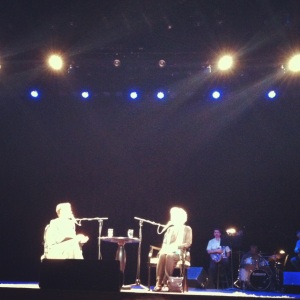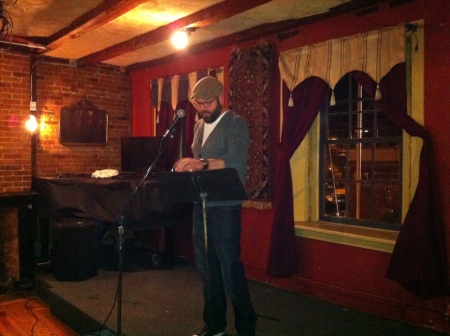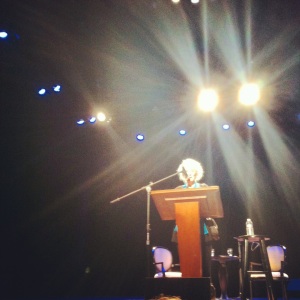To rebut the everything-sucks thesis of my previous post, here’s a photo of me giving my first public reading last week. I am told I did a great job. And as much as I fear public performance and scrutiny, I have discovered that I love to do readings. Especially after two or three gimlets.
Posts tagged writing
Choose another tag?
Rejectionland
A story was rejected yesterday. I’ve had three or four rejections in the last few weeks. I haven’t been submitting long, and I know this is par for the course, but it doesn’t make it any easier.
A bunch of my cohort had dinner with the well-known writer who came for the writer’s series of readings. He gave us a lot of advice about starting out and advised that we shouldn’t even worry about submitting right now, that we’re not ready, that we should be first and foremost honing our craft. He even suggested that we take some time after we finish our MFA before we really get serious, to let those lessons settle in and find your center as a writer. I don’t think that advice is for me. And after one semester, there’s a tiny part of me that’s worrying that this MFA isn’t going to teach me much I don’t already know.
At the end of last spring, I was riding pretty high. I had been accepted into half of the MFA programs I applied to, my senior thesis, a short story collection, won two $1000 awards—the department’s fiction thesis prize and an excellence award. I finished off the semester with two of the strongest stories I’d ever written and things looked good.
But now, it’s almost the end of my first semester of grad school, I’ve had nothing but rejections (though one story was a semi-finalist in a contest) and the last story I wrote is probably the weakest story I’ve ever written, and I’m fearing that I won’t get much out of the MFA. I’m feeling pretty low at the moment and could really use a win. You listening, Universe?
On the other hand, I know that the quality of work tends to dip at the start of an MFA because of the soul-shifting that results from a new place, new people, new methods, new influences, and new pressures. I know that eight bazillion publishers rejected J.K. Rowling and Dr. Seuss and everyone who’s crazy famous now. I know all these things, but those things are no bandage on the little wound of they-don’t-like-me-I-suck festering on my heart.
A thought with another thought’s hat on
I had a dream my cohort was driving around in a flood with big fancy cameras trying to take really crazy pictures. The car was 85% underwater but was running perfectly, like a motorized iceberg. We kept showing eachother our photos and asking how they got a particular shot. Oddly, the cameras weren’t waterproof, so if you took an underwater picture, the camera would shake and sizzle.
This dream is in no way a metaphor for writing workshop, no not at all.
Oxforth of Ordmount
In my continuing series, here’s the beginning of a short piece from 2011 that never went anywhere…
§
Jack French was a London tourist and he was running. And he kept running. He wasn’t wearing the appropriate gear for running. One might think someone running like that would be wearing athletic shoes and perhaps shorts because the weather was so unseasonably warm. One would be wrong. Jack was wearing a Valentino three-piece and a pair of Crocket & Jones oxfords. It is not recommended to run in oxfords. Oxfords have no traction. Jack French knew this of course but there are times when such conventions are impractical. For instance, when one is being chased through the streets by gibbering madness, one is permitted to run anywhere, at any time, at any speed, and in any shoe one desires. One may even forgo shoes entirely.
§
It is almost Oxforth of Ordmount. The fourth moon still lingers above the cherry-hued mountaintops that ensnare this valley. The other three moons have set and yet my wife still sleeps. Her cranberry velvet legs twitch, a jerk, a twinge, a lumbering hare chasing prey in the Other. Her time is near. Soon she will birth us a son. The fetus is ripe and the last stage of gestation is procurement of a soul from the Other. It is a delicate maneuver.
§
She put the finishing touches on her painting though she did not sign it, no not yet. She dabbed a gangrenous shadow across the mountain, the shadow of a cloud, a harpy of a cloud. The slow, dense, black crepuscular mass that frightened children with its immensity, sent them scurrying into the house with its burbling momentum, an infection rumbling across the pristine sky, devouring robin blue like a cancer with a hideous laugh of thunder deep in its bowels threatening to shit freezing hail and lightning onto the cars of housewives and homemakers. She wanted the mountains to fear the cloud. She imagined the mountains retreating in panic from this cloud. Plate tectonics did create mountains. Mountains fleeing this mass of condensed water, dirt, and dust sent the plates rushing in fear for far shores. She stepped back from the canvas and felt something close to Shangri-La shudder from her sacrum to her crown, a serpent of flame unfurling from a long nap, a yawning yearning to incinerate every cell, to realize the potential in every atom, a reactor in every cell division, a furnace in every molecule.
§
Jack skid to a halt at the end of a dark alley. He never understood why people being chased always ran into dark alleys. He’d cursed them as bloody fools in films, but when in the same situation, he’d done the same bloody thing, past dark dumpsters and bins, slipping on God-knows-what in £800 shoes. He listened, waiting for the gate-crashing thunder of his cardiovascular system to retreat from his ears. The opening of the alley was clear, the streetlights shining on the cobblestones. Whatever was pursuing him was gone. The sounds of the night came back like skittish rabbits returning to a lawn after the bark of a dog. An ear here, a twitch of a nose there, a pair of round black eyes like traffic the next street over, like a telly three flats up blasting the news out an open window. Jack’s own belabored breath. One might have heard his adrenaline recede, his autonomic nervous system go offline and refuel. His testicles dropped and sensations like thirst, hunger, and sex returned accordingly. He inched back out of the alley still leaping at every aural oddity, his awareness amped and alive. He was a dead man ten minutes before when the madness came at him with slavering jaws. As he reached the light-bathed street, his pupils constricted and he realized that in all of his forty-six years, he’d never been alive.
§
“Where have you been?” Jack couldn’t quite place her mood. Somewhere half between boredom and annoyance. There should be a word for that. Boreyance. Annoydom. Neologisms danced before his eyes, obscuring the woman he’d been dating for eleven weeks. Her name was Penelope and she was an artist and completely out of his league. Though his friends said it was quite the opposite, that she was the lucky one who’d wrangled a fabulously wll-to-do banker to support her quote-unquote art. Jack didn’t support her art, at least not financially. She’d never asked for a pence to be quite honest. She’d clocked him straight away.
It was Penelope’s first major show at the Serpentine Gallery in Kensington Gardens. The owners of the gallery had recently expanded due to a loan he’d been able to arrange and they’d invited him to the grand reopening. As soon as he saw Penelope, he’d fallen madly, hopelessly in love, which, Jack would agree, was always a very bad sign.
“I’m not a manic fairy dream girl,” she said in a distinct Welsh accent. Jack had only said hello. She wasn’t following the correct social cues at all.
“What?”
“Don’t pretend you didn’t quite hear me. I’m quite sure you did, but you mean what as in you don’t quite understand what I’ve said. To be absolutely transparent, I’m not a manic fairy dream girl. It’s quite obvious that you’ve seen me and fallen head-over-oxfords in lust with me, which you, in your upper-middle class upbringing has confused with love. I am absolutely not your type, you’ve never felt this way about anyone before, et cetera. And I will tell you right now so we are absolutely clear: I am absolutely not going to be the free-spirited artsy-fartsy tart that’s going to break you out of your stick-in-the-mud, uptight bullshit.”
“You’re awfully full of yourself, aren’t you?” He handed her a martini. “It’s not drugged, I swear. I’m quite capable of seducing you without narcotics.”
“Are you now?” She finished the martini in a single swallow and handed the glass back. Penelope spun on her heels, a simple one-eighty, and inject herself into another conversation.
§
“Apologies, Penelope, the service was late arriving with a car.” It was a good excuse, better at least than the truth.
“Cars are so pedestrian.” She affected an accent. Queen’s English.
“How droll.” Jack took a seat and ordered a drink.
“I finished the painting today. I think I broke myself. I put on the finishing stroke this afternoon and I’ve been wonky ever since. I’m not even sure you’re here. It’s entirely possible that you’re not and I’m having a boring nap at the loft. Perhaps I’ve had a stroke and you’ll find my corpse on the floor when you finally get out of the office.” She yawned into the back of her hand.
“It must be your luck day,” he said, taking in the rest of the restaurant. “I can quite assure you that I am indeed out of the office. I am very much here.”
“How can you be sure? I haven’t been sure of anything all afternoon.”
“I’ll tell you what. Let’s get out of here. We’ll go back to the loft and you can introduce me to this masterpiece of yours. If you’ve had a stroke and you’re in a heap on the floor, we’ll find you and get you to a hospital or a morgue or something.”
“That is a fantastic idea. You, sir, are a genius. Call the Nobel committee.” She handed him her coat. Jack held it while she spun and slipped into it, a single remarkable movement, a fluid grace despite her fluid intake. Jack motioned to the waiter for the check when the madness stepped out from behind the bar. His heart broke from his chest, throttled Penelope’s empty glass which shattered against the tabletop. Amorphous and thundering it slunk across the restaurant. it moved through instead of around diners who shivered unaware. They instinctively looked toward the door expecting a cold breeze and returned to their lobsters confused, unable to process why they were cold on such a warm day.
“Jack,” Penelope prompted. “Jack. Are you alright?” She followed his eyes across the distance. The madness vanished, swirling away like fog exposed to sunlight. “Darling, you’re absolutely soaked. Come.” Penelope thrust her arm through his and ushered him from the restaurant.
“Did you see it? You saw it, didn’t you.” His voice was a whisper, sand shuffling over glass.
“If you’re referring to the cloud of fearsome madness that was causing all that ruckus in the restaurant, I saw no such thing.” Penelope thought about her painting and that horrible crepuscular mass.
§
The fourth moon wanes. My wife wakes. I watch her starred pupils dilate, adjusting to the crimson twilight. I can feel her disappointment in my heart. She is close.
“I have anchored into the Other. The net has been set. He will be ours and our son will be ensouled before the next moon of Oxforth of Ordmount.”
Negative Space—The Art of Critiquing
As a fiction writer, you’d think I’d be good at lying. My whole job is literally just making things up. But no, I can’t lie. Or rather, I can, but it is physically uncomfortable. It’s less uncomfortable to say uncomfortable truths. Which can make it seem like I lack tact, diplomacy, social graces, or that I overshare, or am just a plain jackass.
This character trait is particularly problematic in writing workshops and the solution of which is probably the greatest skill I’ve learned in workshop. Basically, I have had to learn how to spin “This sucks” into something constructive. Instead of “Holy shit, look at this ugly fucking hole in the ground,” I’ve learned to say “A big beautiful skyscraper would look fantastic right here.”
And I’m realizing it’s a fantastic skill to have. It’s incredibly easy to be a negative person, to see failure and deficiency everywhere, to see only the shits and the sucks and the ohmygodfuckthis’s. Instead, if in every failure, you train your brain to see potential, you can sound like a motivational speaker.
Jesus, that’s what I just did. I just independently invented motivational speakers.
Fuck positivity. Good art uses negative space. Feel free to suck as much as you want and when you want my opinion, I’ll tell you exactly how much it sucks.
But I’ll also tell you how much it’s awesome, so deal with it.
Is it not?
I went to see Margaret Atwood at the Music Hall is Portsmouth last night (which is a lovely theatre, by the way.) This is the second time I’ve seen her, the previous time was at a Nelson Institute thing in Madison. There was a much longer Q&A section this time, with a sit-down interview.
I noticed a particular quirk. When she explains something that she feels is fairly self-evident, she adds “Is it not?” or a variation of that as punctuation to her statement. It’s charming and funny and much classier than saying, “Duh!”

Margaret being interviewed.
Her novel, Blind Assassin, is one of my favorite books and really solidified for me what kind of literature I want to write. It’s often my go-to book when I’m trying to turn literary fiction fans onto scifi or vice-versa.
I got to meet her at the VIP thing afterward and I told her the story about how she ended up in my MFA application essay, of which the following is an excerpt:
I saw Margaret Atwood speak a couple years ago and someone asked her why she writes the kinds of stories she wrote. She said that she thought that writers write what they are (secretly, or not-so-secretly) afraid of. That illuminated something in my own writing and most of the writing that I love. I love trying to recreate complicated mental states in my readers, like the terror of being unable to trust your own mind. I love atypical neurologies, I love unreliable narrators. I love normal people lovingly rendered, faults and all, thrust into outrageous circumstances. One of Vonnegut’s rules of writing is that you must make awful things happen to your characters in order that the reader can see what they are made of. Between Vonnegut’s axiom and Atwood’s insight, the project of my stories finally made sense, the arc of my relationship to writing rendered visible.
Atwood was pleasant and adorable, but I could tell she was much interested in eating the pastry in front of her than in my story. And that’s okay, those were some damned fine pastries.
2013: A Fiction Odyssey
I went to the orientation day for my program on Tuesday. They fed us lunch and told us that it’s not okay to isolate yourself, that if you feel alone, you should talk to someone. A certain amount of anxiety is good and can propel one to be productive, but if you’re more anxiety than productivity, then you should talk to someone.
This message was reiterated several times in different ways. It was definitely the theme of the orientation.
Otherwise, it was a little over an hour of hey-welcome-don’t-freak-out-you’re-all-in-the-same-boat.
The director of the program is a 59-year old poet. He sat on the desk and took his shoes off. At that point, I remembered the last initial in the degree I’m seeking. MFA. Art. I’m in an art department.
I’m surrounded by artists. This is no different than making a shitty ashtray out of coiled clay in first grade.
You can put out a cigarette on anything.
I think I’m going to be okay.


